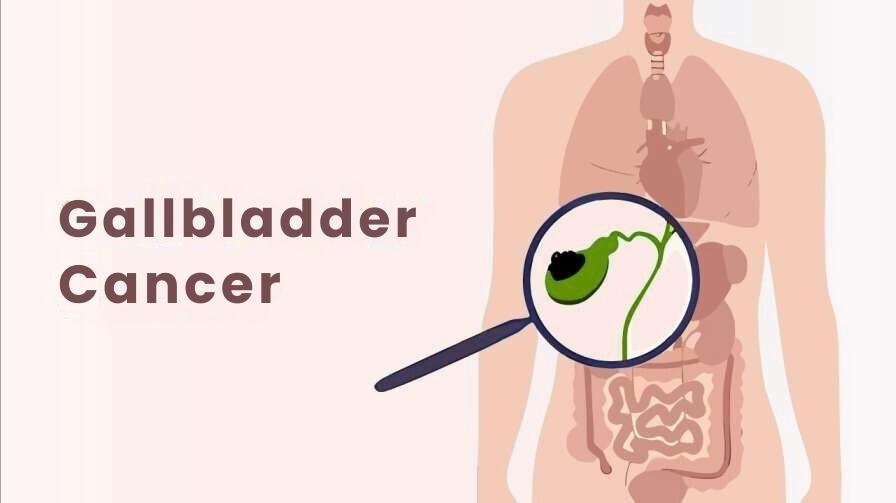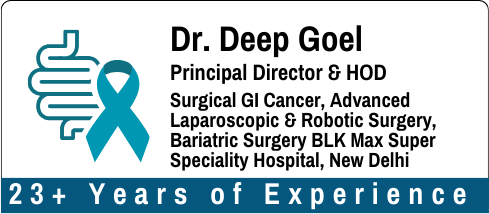What Is Gallbladder Cancer? Symptoms, Risks, and Treatment Explained

Gallbladder cancer is a rare but serious disease that starts in the gallbladder, a small organ located beneath the liver. This organ stores bile, a digestive fluid that helps break down fats. Gallbladder cancer often begins in the inner lining of the organ and can spread to nearby tissues and organs. Early detection is challenging because symptoms are usually absent in the initial stages. As the disease progresses, it becomes harder to treat, making awareness and prompt medical attention crucial.
Gallbladder cancer accounts for approximately 1.2% of all global cancer cases and is more common in women, with the highest incidence observed in regions like northern India, South America, and eastern Europe.
In this blog, we will explore everything about gallbladder cancer, from its symptoms to its treatment options.
What are the Symptoms of Gallbladder Cancer?
Gallbladder cancer may not show symptoms early, but as the disease progresses, common symptoms include:
- Abdominal Pain: Persistent discomfort or pain in the upper right part of the abdomen.
- Jaundice: Yellowing of the skin and eyes due to blockage of the bile ducts.
- Nausea and Vomiting: Digestive issues and a feeling of discomfort.
- Unexplained Weight Loss: Significant weight loss without any apparent reason.
- Loss of Appetite: A reduced desire to eat.
- Fever: Periodic low-grade fever.
- Lumps in the Abdomen: Swelling or a noticeable mass near the gallbladder area.
These symptoms can overlap with other conditions, such as gallstones or liver diseases. Early medical consultation is vital for an accurate diagnosis.
What are the Causes of Gallbladder Cancer?
The exact causes of gallbladder cancer are not fully understood, but several risk factors contribute to its development:
- Chronic Inflammation: Long-term inflammation of the gallbladder, often due to gallstones, increases cancer risk.
- Gallbladder Polyps: Noncancerous growths in the gallbladder that may become malignant over time.
- Age and Gender: Women and individuals over the age of 60 are more prone to this cancer.
- Family History: A genetic predisposition to gallbladder or other cancers.
- Infections: Chronic infections such as Salmonella typhi.
- Lifestyle Factors: Obesity, smoking, and a diet high in unhealthy fats contribute to higher risks.
Dr. Deep Goel, a renowned Gastrointestinal Onco Surgeon, explains, “Gallbladder cancer often remains undetected in its early stages, which is why early diagnosis and intervention are critical. With the right treatment plan, including advanced surgical techniques, we can improve outcomes and give patients a fighting chance.”
What are the Treatment Options for Gallbladder Cancer
Treatment options depend on the stage of the cancer and the patient’s overall health. Common treatments include:
Surgery
Surgery is the primary treatment for early-stage gallbladder cancer and involves:
- Simple Cholecystectomy: Removal of only the gallbladder, suitable for very early-stage cancers.
- Radical Cholecystectomy: A more extensive procedure that removes the gallbladder, parts of the liver, and nearby lymph nodes to prevent the spread of cancer.
- Palliative Surgery: Performed in advanced stages to relieve symptoms such as bile duct blockage and improve the patient’s quality of life.
Chemotherapy
Chemotherapy uses drugs to kill or slow the growth of cancer cells and is often used in conjunction with other treatments.
Radiation Therapy
Radiation Therapy uses high-energy rays or particles to target and destroy cancer cells. It is sometimes used after surgery or for palliative care.
Targeted Therapy
This approach focuses on specific molecules involved in cancer growth and progression, providing a more precise treatment option.
Immunotherapy
Immunotherapy boosts the immune system’s natural ability to fight cancer, showing promise in advanced cases.
Combination therapy is often employed for better outcomes, especially in advanced stages.
Manisha Kumari, a patient Dr. Deep Goel recently assisted, expressed her gratitude, saying, “Dr. Deep Goel is the best doctor for surgery. He performed my appendix operation after I was suffering from unbearable pain. Within just a couple of days post-surgery, I was able to resume my routine life. A big thanks to him and his team, wishing them all the best!”
What is the Cost of Gallbladder Cancer Surgery in India?
India offers affordable and high-quality treatment for gallbladder cancer. The cost varies depending on the type of surgery and hospital:
- Simple Cholecystectomy: INR 50,000 to INR 1,50,000 (approximately 600 to 1,800 USD)
- Radical Cholecystectomy: INR 2,00,000 to INR 4,00,000 (approximately 2,400 to 4,800 USD)
- Palliative Surgery: INR 1,00,000 to INR 3,00,000 (approximately 1,200 to 3,600 USD)
Additional costs include diagnostic tests, hospital stays, postoperative care, and medications. Despite these, treatment costs in India are significantly lower compared to many other countries, making it a preferred destination for medical tourism.
What is the Recovery Time for Gallbladder Cancer Surgery?
Recovery time depends on the type of surgery and the patient’s overall health:
- Simple Cholecystectomy: Recovery typically takes 2–3 weeks. Patients can resume light activities within a few days but should avoid strenuous tasks.
- Radical Cholecystectomy: Recovery may take 6–8 weeks or longer. Regular follow-ups and a well-balanced diet aid in recovery.
- Palliative Surgery: Focuses on symptom management rather than cure, with recovery tailored to the patient’s condition.
During recovery, it is essential to follow the doctor’s advice, maintain a nutritious diet, and avoid heavy lifting or strenuous activities. Regular check-ups ensure the absence of complications.
Conclusion
Gallbladder cancer is a challenging disease, but early detection and prompt treatment improve outcomes significantly. Understanding the symptoms, causes, and treatment options can lead to timely medical intervention. Surgery, combined with other therapies, remains the most effective treatment for early-stage gallbladder cancer.
If you experience symptoms or have risk factors, consult a healthcare professional immediately for an accurate diagnosis and care.
FAQs
1. Can Gallbladder Cancer Spread to Other Organs?
Yes, gallbladder cancer can spread (metastasise) to nearby organs such as the liver, bile ducts, stomach, or intestines. Early detection is crucial to prevent the spread.
2. What Role Does Diet Play in Gallbladder Cancer Risk?
A diet high in unhealthy fats and low in fruits and vegetables can increase the risk of gallbladder cancer. Adopting a balanced diet rich in fiber, vitamins, and antioxidants may help reduce the risk.
3. Are Gallstones Linked to Gallbladder Cancer?
Yes, gallstones are a significant risk factor for gallbladder cancer. Chronic inflammation caused by gallstones can contribute to the development of the disease over time.
4. What Tests Are Done to Check for Gallbladder Function?
Tests such as a HIDA scan, MRCP (Magnetic Resonance Cholangiopancreatography), or ERCP (Endoscopic Retrograde Cholangiopancreatography) can assess gallbladder function and detect abnormalities.
5. Can Gallbladder Cancer Be Treated Without Surgery?
In advanced cases or for patients not fit for surgery, treatments like chemotherapy, radiation therapy, immunotherapy, or targeted therapy may be used to manage the disease and improve quality of life.
Explore more blogs: Nutrition and Diet After Gallbladder Cancer Surgery

